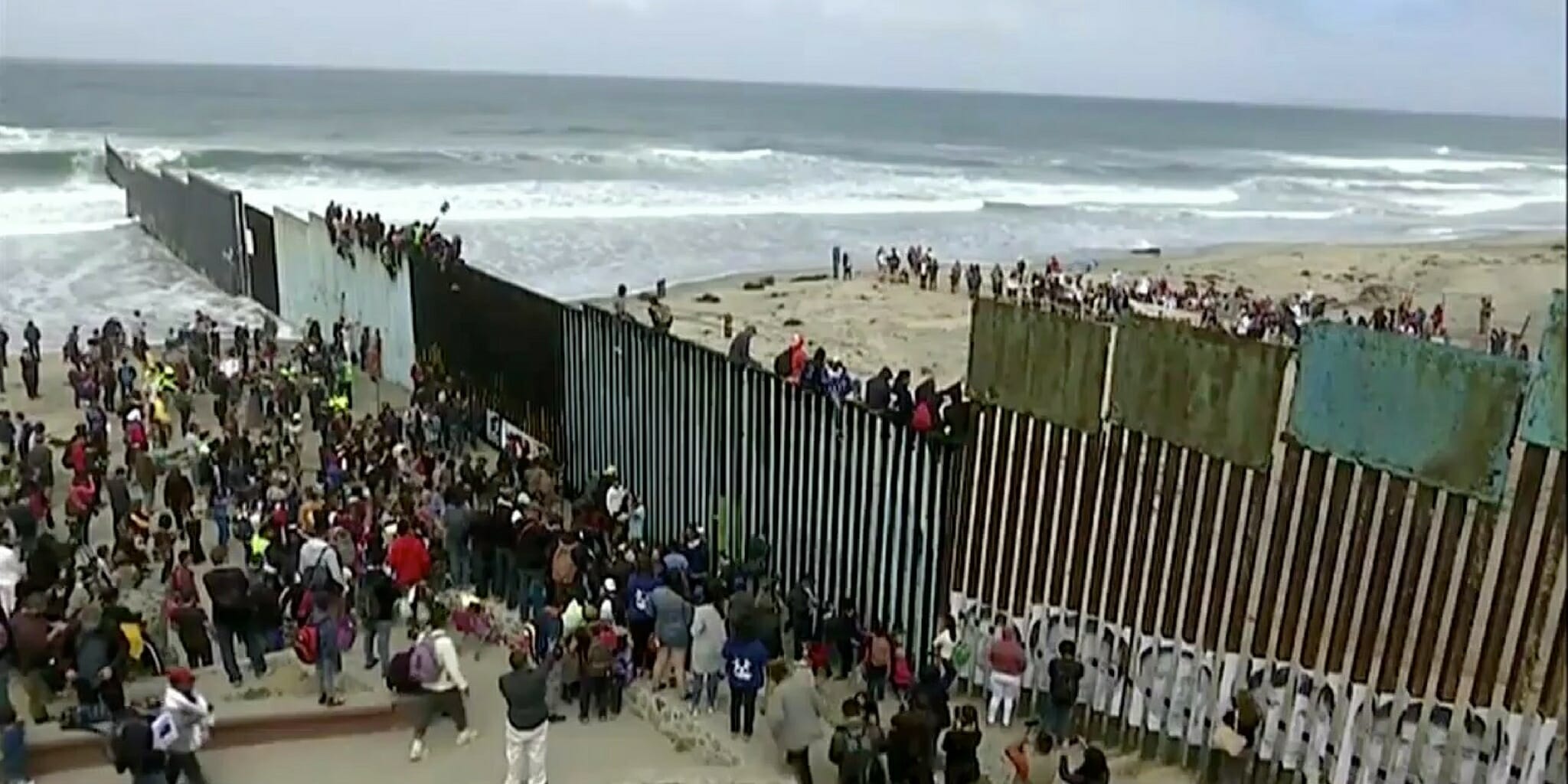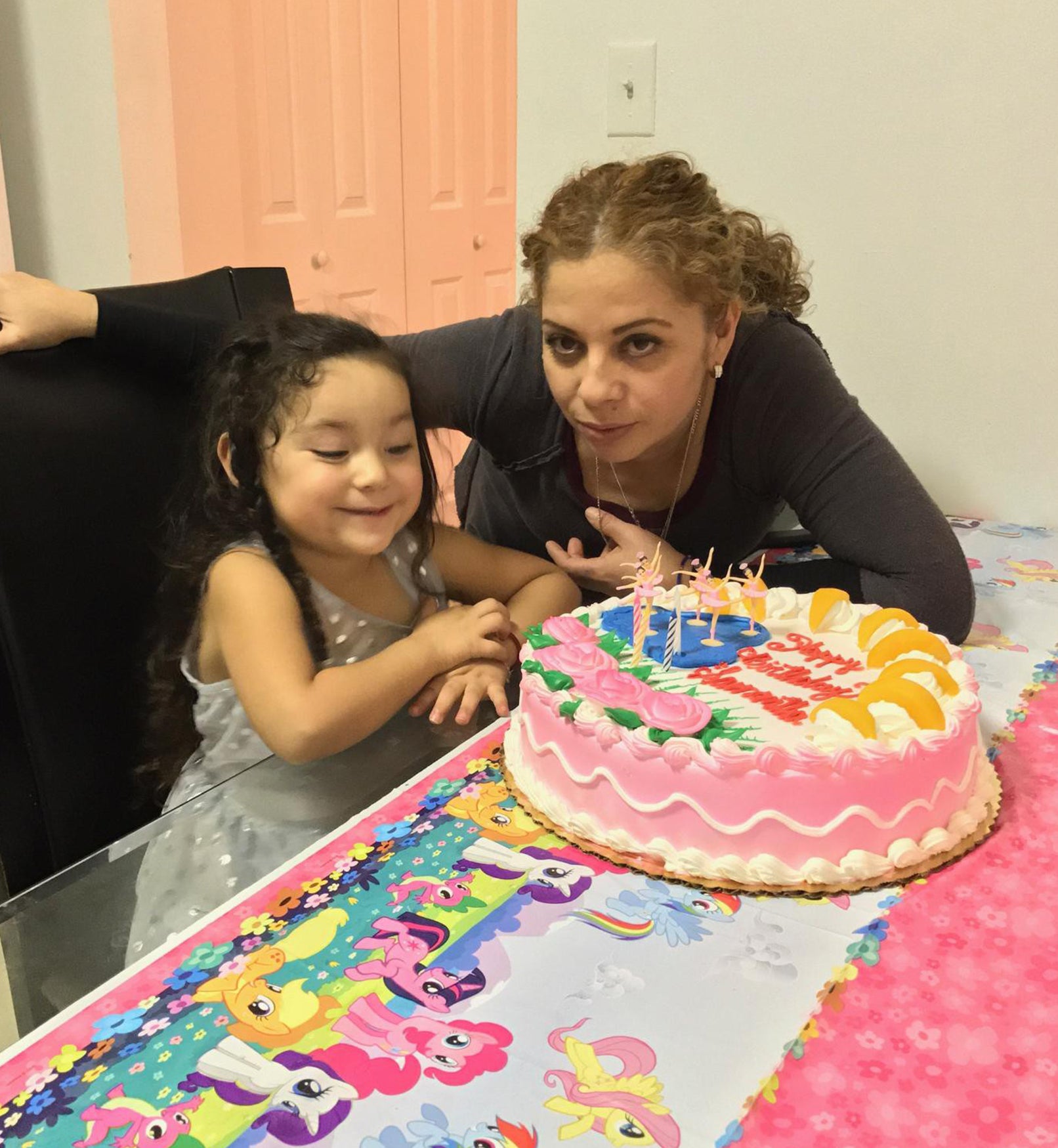Five-year-old Samantha cries inconsolably into the phone. She’s hurt and angry that her mother won’t come for her.
“They hit me really hard,” Samantha wails to her mother who, 1,000 miles away, feels utterly helpless. Melvin Griselda Cruz-Lopez, 46, is in an immigrant detention center in Texas, while Samantha is living with her father in Illinois. Griselda says this man, her ex, has physically abused them both.
“Why do they hit you?” Griselda asks about the vague “they.” In the past, her daughter has complained about family members on her father’s side hitting her too.
“Because, because, because I was bad,” Samantha responds. You can hear the desperation in the child’s voice as she pleads for her mother’s return. It pains Griselda that all she can do from detention is promise her daughter an endless supply of hugs when they reunite.
That phone call happened last December, recorded by Griselda and given to immigrant advocacy group Grassroots Leadership. Griselda’s lawyer couldn’t say how many times the mother and daughter spoke after that call—only that they haven’t spoken in more than two months, since Griselda’s ex-partner cut off all contact.
“I will never forget the first video call I had with [Samantha],” Griselda told the Daily Dot in Spanish, via a phone call from T. Don Hutto Residential Center in Taylor, Texas, this month. “Before being placed at a detention center, I was deported to my country, El Salvador. The first impression my daughter had once she saw me on the screen was to ask: ‘Why haven’t you seen me? You don’t love me? Why did you leave me here? Why don’t you come to get me?’”

Griselda says before she was detained, her daughter was social. She attended school, she had several friends, she appeared happy. Samantha would write her little notes or paint or draw her something. It was Samantha’s way of letting her mother know she was thinking of her throughout the day.
Once separated, “she would cry during the video chat,” Griselda said.
“I’m here instead of taking care of my daughter. Taking her to school like any other parent. I can’t have a normal life,” she said. “This situation is isolating me from my child.”
Griselda says it’s clear her daughter is being abused, but she doesn’t know the severity, and she fears there has been sexual abuse as well. She can’t even confirm if Samantha is attending school. She hasn’t physically seen her daughter in more than a year. All she can think about is getting out of detention and rescuing Samantha from this nightmare.
Unfortunately, Griselda’s case for asylum is looking grimmer by the day.
…
The trouble started when Griselda fled El Salvador amid death threats and gang violence nearly 20 years ago. She traveled over 3,000 miles in search of a better life in the United States. In 2012, she and the man who’d eventually become her ex had Samantha in the Chicago area.
Griselda said over the years, her partner, who is also undocumented, grew physical and combative. According to a statement from Grassroots Leadership, an immigrant advocacy group working on Griselda’s case, he “pushed Griselda down the stairs and repeatedly became physically aggressive in Samantha’s presence.”
Griselda ultimately left. She said her ex did not take kindly to the fact that she took their daughter with her.
They verbally set a joint custody agreement where Samantha would split time between parents. When Samantha would come home, she would tell her mother she no longer wanted to go to her father’s place. She said family members hit her.
Then last October, someone called immigration on Griselda and she was detained while walking to her restaurant job. Griselda believes it was her ex-partner who tipped off U.S. Immigration and Customs Enforcement (ICE). It all happened so abruptly, she didn’t even have time to properly say goodbye to her daughter. Samantha was too young to understand the ins and outs of U.S. immigration law and the fact that her mother was undocumented. All she understood was her mother wasn’t there and she wanted her to come get her.
Since being in detention, Griselda’s physical well-being has also declined. She said she has endured debilitating pain resulting from a head trauma that occurred from fainting after taking unknown medication.
Despite all this, ICE has denied multiple legal and community requests for Griselda’s release on humanitarian grounds, according to Grassroots Leadership. ICE did not respond to the Daily Dot’s specific questions regarding Griselda’s case since she’s been at the Taylor detention center, but officials did release a statement outlining her interactions with the agency: That she was “first encountered” by immigration officials in Arizona in 2005; a few months later, a judge ordered she be “removed,” though she wasn’t present for her court date. In October 2017, she was arrested by ICE, and a month later, she was “removed” to El Salvador.
“On Jan. 27, 2018, Cruz-Lopez was arrested again by immigration officials after she illegally re-entered the United States near Hidalgo, Texas, and she was transferred to ICE custody,” ICE’s statement continues. “On Oct. 5, 2018, an immigration judge issued her another final order of removal. She remains in ICE custody pending the disposition of her immigration case with the Board of Immigration Appeals (BIA).” Griselda’s lawyer confirms ICE’s timeline is accurate.
ICE officials said the agency “fully supports” the judicial and appellate process. However, if convicted, migrants who re-enter the United States after previous deportation face a felony punishable by up to 20 years in prison.

“Despite the danger to her daughter and their culpability in her acute medical state, ICE did not provide any stated explanation in response to a congressional inquiry into their denial of Griselda’s release,” Grassroots Leadership said in a statement.
Over the past few months, community members have rallied support for Griselda’s asylum case and attempted to reunite her with Samantha. Hundreds have signed a petition via Grassroots Leadership’s website. Local media outlets have covered Griselda’s ordeal. Even town officials have visited her in detention.
However, it seems that the visibility of Griselda’s case may actually be a detriment. Griselda was abruptly transferred to an immigrant detention center in Laredo, Texas, after a visit from a Taylor city councilmember and an attempted visit from the town’s mayor a few weeks ago. At Laredo, Griselda is charged a fee for calls, hindering her communication with supporters and loved ones.
“I fear my recent visit with Griselda led to her late night transfer to Laredo,” said Councilmember Mitchell Drummond in a statement to Grassroots Leadership. “She has a family here in the states waiting to take her in; why are we spending tax dollars to protect us from a young woman and her child? I feel this is immoral and am ashamed that we are allowing this to continue. As I left Griselda, I told her I would do whatever I could to get her released.”
Her transfer was a week after Griselda said ICE officials at T. Don Hutto told her there had been no appeal filed in her case and she needed to sign her own deportation order. She said they told her she would go crazy if she spent six more months there as other women have. When questioned about Griselda’s sudden transfer, ICE told the Daily Dot in a statement: “Transfers in ICE custody are made by authorized officials on the basis of complete and accurate case information, as outlined in ICE detention standards. The allegations of retaliatory practices in Ms. Lopez’ case are without merit.”
Grassroots Leadership representatives disagree, saying the move is an obvious “intimidation tactic.” Griselda’s lawyer, Kate Lincoln-Goldfinch, who’s working pro bono, filed an asylum appeal to the Board of Immigration Appeals just days before.
As of last week, Griselda said ICE officials told her she could be back in El Salvador as early as Wednesday morning.
…
Under the Trump administration, ICE has taken a no-holds-barred approach to crack down on asylum seekers crossing the border. In June, former Attorney General Jeff Sessions dropped, with rare exception, asylum protections for immigrants attempting to escape domestic and gang violence in their home countries. This was seen by immigrant advocates as the administration’s official stance on both immigrants and women: We don’t care about you.
Shortly thereafter, this policy would be overtaken in the news cycle by the administration’s child separation policies, which affected more than 2,000 kids—some of whom were so young, they were taken directly from their mother’s breast—before Trump said he’d end the separations amid an international outcry.
Since then, however, the Trump administration has only upped its anti-immigration policies and sentiment. These days, a caravan of thousands of Central American migrants has been the source of endless headlines, with border officials most recently tear-gassing and shooting rubber bullets at migrant mothers and children. While conservative outlets tout the “danger” these migrants pose to America, much like with the child separation crisis, little attention is paid to who these people actually are (families with young children) and why they would risk such a trek to America in the first place (the violence in their home country is that much more horrific). In fact, half of the estimated 2,500 undocumented people who enter the United States daily are reported to be women who are escaping violence or threats of violence.

El Salvador, where Griselda is from, has one of the highest rates of violence against women in the world: 152 women were murdered between Jan. 1 and May 1 in the country, according to the National Women’s Development Institute. El Salvador is not the only country with high femicide rates; Argentina, India, Honduras, and Mexico also have high rates of violence against women. According to data from the U.S. Citizenship and Immigration Services, more women sought asylum from Central America’s Northern Triangle—which includes El Salvador, Guatemala, and Honduras—between 2013 and 2015 than in the previous 15 years combined.
Griselda is not only one of those women seeking asylum to escape violence in her home country; she has tried to escape abuse again in America. And now she says she is being punished doubly, for protecting herself and her daughter.
…
In this era of anti-immigrant policy, it’s not absurd to believe that domestic abusers feel somewhat emboldened to report their immigrant victims to authorities, says Griselda’s lawyer, Lincoln-Goldfinch. It’s another way to exert control.
In one such notorious case shortly after Trump took office, Estrella González, a transgender woman from Mexico, was sitting in a courthouse in El Paso waiting for a judge to hear her request for a protective order against her abusive ex-partner when ICE arrested her. González believes her ex-partner was the one who reported her to ICE.
“They’re threatening to use that person’s legal status as a method of retaliation,” González’s lawyer, Melissa Ureteker, told the Daily Dot. “It was one of the first cases where we saw ICE going to sensitive locations. It represented a shift in tactics by an emboldened stance on immigration since President Trump took office. People are becoming emboldened by a rhetoric against immigrants as long as that rhetoric remains out in the spotlight and being promoted by our government leader.”
While it’s unclear how many undocumented immigrants are being tipped off to authorities by their abusive exes, survivors in this type of scenario might actually have some legal protection. Christina Garcia, Crime Victims Program director at Las Americas Immigrant Advocacy Center in El Paso, Texas, who has worked on similar cases, said we need to rethink the immigrant section of the 1994 Violence Against Women Act, which allows survivors of domestic violence to apply for certain types of immigration status and relief.
“What it says, basically, is that ICE should not be taking tips from the perpetrator or the abuser to process an individual,” Garcia said. She is looking into whether ICE can be held accountable to identify non-anonymous tipsters.
“Maybe at that point, the immigration proceedings would be moot because technically that individual wasn’t served a proper Notice to Appear, an NTA, because they were tipped off by the perpetrator. That’s a loophole that I’ve been experimenting with right now,” she said. “I have court in a few weeks, so we’ll see if it even flies and it helps us to hold the individual accountable.”
However, she said, the situation is totally different if an individual actually made a tip anonymously, which is what ICE is saying happened in Griselda’s case.
“The thing that is very bothersome is that when Congress created the Violence Against Women Act in 1994, they did it with the intent to protect individuals eligible for VAWA from deportation. The thing we’re seeing now is that judges are not able to even accept those pending applications if it’s not what they call ‘relief in a court,’” said Garcia. “The extra dangerous part is that these people can potentially get deported and maybe relinquish their parental rights completely, which is terrifying, and part of the abuse from day one.”
…
Despite ICE’s threats and actions, Griselda has refused to sign her own deportation order. She is armed with the knowledge of her right to appeal. Her desire to get her daughter to safety is what gives her the strength not give up.

“I’m fighting for my daughter. I don’t want to lose her,” she told the Daily Dot. “I want to call CPS from here, but it’s not possible. The calls from here don’t go through in the system.”
One thing giving Griselda and fellow detainees hope is seeing other abuse survivors released. Laura Monterrosa, who says she was sexually abused by guards in detention, had her case suspended by ICE for a year and was able to bring her story to the public.
“On one hand, the women see they have people on their side. They see their personal power through women like Laura Monterrosa, who was very loud and clear and was released,” said Sofia Casini, immigrant rights organizer at Grassroots Leadership. “There are avenues for support and help.”
In the meantime, Griselda is sending letters to her daughter through her ex-partner’s sister, who said Samantha becomes teary-eyed, shaky, and sentimental when she hears them. However, his sister is also in the United States without authorization and told Griselda that he threatened to report her to immigration if she kept communicating with Griselda about Samantha. Grassroots Leadership advised that contacting Griselda’s ex could lead to him running off with Samantha; the Daily Dot did not reach out to him for comment as a result.
A mother’s love cannot be deterred, though. “I’m still going strong and fighting for my daughter,” Griselda said. “I’m going to fight until the end.
Update 8:44pm CT, Nov. 30: Despite ICE’s alleged threat to deport Griselda as early as 11am on Nov. 28, Griselda remains in detention, according to Grassroots Leadership. Rep. Jan Schakowsky (D-Ill.) and Taylor Councilmember Mitch Drummond both wrote ICE requests for her release this week.


